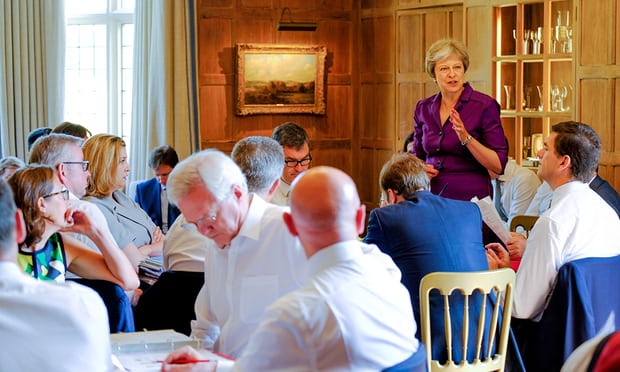I’m an ardent Brexiteer, but May’s plan is a pragmatic compromise
The Guardian
Michael Fabricant
So have we Brexiteers got everything we wanted in the Chequers deal? The short answer is ‘No’. Not if Brexiteers expected the cleanest of breaks from Europe.
But it probably was never going to be that way if we wanted to continue to trade seamlessly with the EU.
‘The biggest problem Theresa May now faces is selling this complex and nuanced proposal
to her MPs and the British public.’ Photograph: Joel Rouse/10 Downing Street/EPA
The departure of Boris Johnson from the Cabinet is one I regret. He added life and colour. He prefers the broad picture, the principles, rather than the minutiae.
The problem for him and others is that the deal that is being proposed is a necessarily complex, but it is an interesting one. For, like everything in life, nothing is black and white.
And while it won’t satisfy the Trappist monk wing of Brexiteers who believe in the complete purity and absoluteness of Brexit, the deal will satisfy many who still want some sort of continuing relationship with the continent. But the deal raises many questions which have yet to be answered.
When the Cabinet met last Friday they discussed in detail the Trans-Pacific Partnership and whether our membership of that would be impossible by virtue of the Common Rule Book. The view was that it would not. But the jury is probably still out.
The Common Rule Book between the UK and the EU will ensure a commitment to the maintenance of high standards of consumer and employment rights as well as protection of the environment. This commitment was made early on by Theresa May when she became Prime Minister when committed Remainers – and the Labour Party – claimed that we would become a Malaysia style, regulation-free economy after Brexit.
But will the Book stop us from making trade agreements with the US and elsewhere? Given the difficulty in negotiating a deal between the EU and US, if we maintain EU rules will this prevent our negotiating similar agreements?
When the Cabinet met last Friday they discussed in detail the Trans-Pacific Partnership and whether our membership of that would be impossible by virtue of the Common Rule Book. The view was that it would not. But the jury is probably still out.
Will the deal be acceptable to the EU? Over the last few weeks, the PM and civil servants have been in meetings with foreign leaders and the EU sounding them out. Whatever the immediate rhetoric from Brussels, the EU is unlikely to reject these proposals out of hand. But what further compromises must be made for the EU to agree to these terms? At what point would we have to walk away? What are the red lines?
Two hours were spent discussing just this at Friday’s Chequers meeting. The upshot now is that No Deal Planning will be stepped up so that we shall be ready in the event of this happening. This also sends out a useful signal to those sitting on the opposite side of the negotiating table to us: ‘We don’t want to walk away, but we will if you force us to’.
David Cameron was unable and unwilling to deploy this argument when he tried to wring concessions out of the EU. And he got none. That lesson has been learned.
It is common for the British media to imply that Britain has a weak hand in these negotiations. German and French newspapers report differently. We are a huge export market for continental Europe. Each year, 600,000 German cars are exported to the United States. But just under one million are exported to the UK. We are the biggest export market in the world for the German automotive industry.
There are similar stats for French agriculture exports and, yes, Italian Prosecco. Political leaders in Europe are very conscious of a No Deal Brexit and the damage it will do to their employment rates. In Germany, estimates range from 8,000 to 40,000 jobs lost domestically if a deal is not agreed with the UK.
So, if the deal is accepted by the EU, will Britain be “a vassal state” as some have argued?
Even the Trappist monk wing of Brexiteers will recognise that free movement will be ended and border controls with Europe reinstated. And the PM has made clear she will not entertain any possibility of our paying for continued access to the EU market. There will be a huge Brexit dividend.
We will leave the Common Agriculture Policy and the Common Fisheries Policy and the jurisdiction of the European Court of Justice in the UK will be terminated. And yes, we will Brexit at 11pm on 30th March 2019.
The biggest problem Theresa May now faces is selling this complex and nuanced proposal to her MPs and the British public.
The deal could be a Grand Compromise that restores the independence of the UK while boosting our domestic economy. Some will see it as a sell-out and a Grand Betrayal.
As an ardent Brexiteer, I go for the former.
https://www.theguardian.com/commentisfree/2018/jul/09/brexiteer-may-chequers-europe
